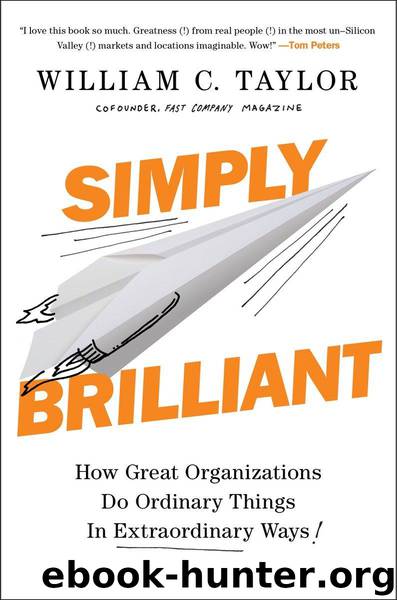Simply Brilliant: How Great Organizations Do Ordinary Things in Extraordinary Ways by William C. Taylor

Author:William C. Taylor
Language: eng
Format: mobi, epub, azw3
Publisher: Penguin Publishing Group
Published: 2016-09-19T23:00:00+00:00
In a world being reshaped by technology, what so many of us crave are small gestures of kindness that remind us of what it means to be human.
Now here’s the real question: Why is it so rare for businesspeople to behave like the Buick dealer, and so common for businesspeople to behave like the Cadillac dealer? It remains a mystery to me, but there’s nothing mysterious about the results of those contrasting behaviors. Nobody is opposed to a good deal—a dollars-and-cents value proposition, as we discussed in chapter 1. But what we tend to remember, what we appreciate, what we prize, are gestures of concern and compassion that introduce a touch of humanity into the all-too-bloodless calculations that define so much of twenty-first-century commerce and modern life. Not always a head-turning, one-of-a-kind values proposition of the sort pioneered by Metro Bank or 1111 Lincoln Road, but just enough civility and decency to represent a welcome alternative to standard operating procedure.
The evidence is all around us. Imagine my fascination, as someone who believes in the power of small gestures to send big signals, when the front page of the New York Times carried a report on a “broad and transformative trend” that was sweeping Russia. It had nothing to do with more democracy, less corruption, or a turn away from military adventurism. It had to do with simple ideas about customer service—specifically, an intense focus inside Aeroflot, the famous (infamous, really) airline, to teach flight attendants how to connect with their passengers as human beings. “Gone are the scowls, the cold shoulders and the wordless encounters” that had defined the Aeroflot experience, the Times reported. In their place were appeals for warmth, pleasantries, and, gasp, smiles. The result was “a mini Velvet Revolution for a region accustomed to old ideas of Russian service.”
In the old days, the article noted, flight attendants received training from choreographers with the Bolshoi Theatre on “stride and movement”—the better to display their admire-from-a-distance beauty and unapproachable elegance. Now the focus is on making conversation, striking up personal interactions, being nice to customers who don’t expect it. “Anna, you just showed her the champagne bottle but didn’t say anything,” one instructor coaxed a trainee. “This is the silent service of Soviet times. You need to talk to her. And you need to smile and smile and smile.”4
I found two things especially noteworthy about this report. First, these ridiculously simple reminders have had a huge impact inside Aeroflot. According to the Times, customer surveys indicate that the airline has the best-ranked service of any carrier in eastern Europe, including Western airlines and their partners who operate in the region. Second, Aeroflot’s program was gaining altitude at a time when the business culture in the United States and Europe seemed to be questioning the value of human-to-human connections. In an era of cutthroat competition, deep-seated cynicism, and the digital disruption of everything, who wants to make big bets on the power of small gestures? Not very many organizations, it
Download
Simply Brilliant: How Great Organizations Do Ordinary Things in Extraordinary Ways by William C. Taylor.epub
Simply Brilliant: How Great Organizations Do Ordinary Things in Extraordinary Ways by William C. Taylor.azw3
This site does not store any files on its server. We only index and link to content provided by other sites. Please contact the content providers to delete copyright contents if any and email us, we'll remove relevant links or contents immediately.
Tools of Titans by Timothy Ferriss(8365)
Change Your Questions, Change Your Life by Marilee Adams(7759)
Deep Work by Cal Newport(7064)
Playing to Win_ How Strategy Really Works by A.G. Lafley & Roger L. Martin(6237)
Man-made Catastrophes and Risk Information Concealment by Dmitry Chernov & Didier Sornette(6005)
Big Magic: Creative Living Beyond Fear by Elizabeth Gilbert(5754)
Digital Minimalism by Cal Newport;(5749)
Ego Is the Enemy by Ryan Holiday(5413)
The Slight Edge by Jeff Olson(5410)
The Motivation Myth by Jeff Haden(5204)
The Laws of Human Nature by Robert Greene(5172)
Stone's Rules by Roger Stone(5081)
Tuesdays with Morrie by Mitch Albom(4769)
Eat That Frog! by Brian Tracy(4525)
Rising Strong by Brene Brown(4450)
Skin in the Game by Nassim Nicholas Taleb(4239)
The Money Culture by Michael Lewis(4198)
Bullshit Jobs by David Graeber(4179)
Skin in the Game: Hidden Asymmetries in Daily Life by Nassim Nicholas Taleb(3989)
